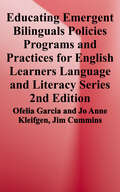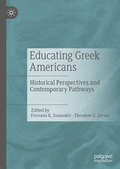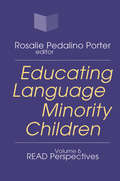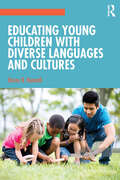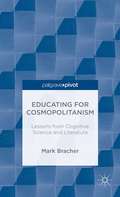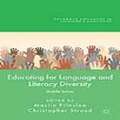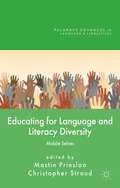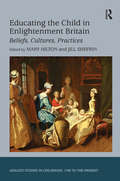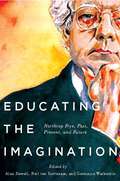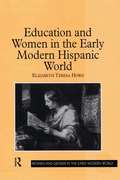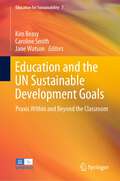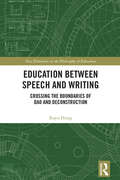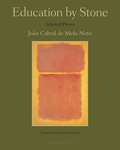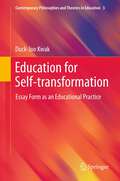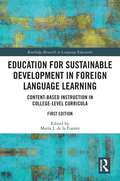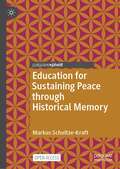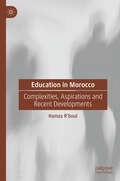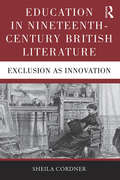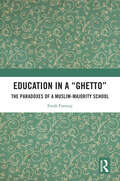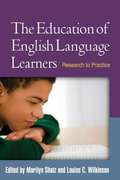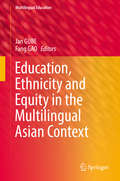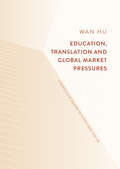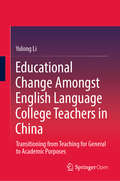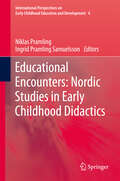- Table View
- List View
Educating Emergent Bilinguals: Policies, Programs, and Practices for English Learners (Language and Literacy Series)
by Jo Anne Kleifgen Ofelia GarcíaThis accessible guide in a revised and expanded edition introduces readers to the issues and controversies surrounding the education of language minority students in the United States. What makes this book a perennial favorite are the succinct descriptions of alternative practices for transforming our schools and students' futures, such as building on students' home languages and literacy practices, incorporating curricular and pedagogical innovations, using proven-effective approaches to parent engagement, and employing alternative assessment tools. <p><p>The authors have updated their bestseller to reflect recent shifts in policies, programs, and practices due to globalization and the changing economy; demographic trends; and new research on EL pedagogy. A totally new chapter highlights multimedia and multimodal instructional possibilities for engaging EL students. <p><p>This Second Edition is essential reading for all teachers of language-minority students, as well as principals, superintendents, and policymakers. <p><p>Book Features: <p>- Uses the most up-to-date research findings to demonstrate how ignoring children's bilingualism perpetuates inequities in their schooling. <p>- Points out the problems with current policies and practices and proposes more effective alternative methods. <p>- Contrasts the common view of bilingualism as either subtractive or additive with more current understandings of individual bilingualism in translanguaging theories. <p>- Highlights how multimodalities form part of students' communicative repertoire and shows teachers how they can leverage this to engage students.
Educating Greek Americans: Historical Perspectives and Contemporary Pathways
by Theodore G. Zervas Fevronia K. SoumakisThis edited collection considers Greek American formal and informal educational efforts, institutions, and programs, broadly conceived, as they evolved over time throughout the United States. The book’s focus on Greek Americans aims to highlight the vast array of educational responses to local needs and contexts as this distinct, yet, heterogeneous immigrant community sought to maintain its linguistic, cultural, and religious heritage for over one hundred years. The chapters in this volume amend the scholarly literature that thus far has not only overlooked Greek American educational initiatives, but has also neglected to recognize and analyze the community’s persistence in sustaining them. This book is an important contribution to an understanding of Greek Americans’ long overdue history as a significant diaspora community within an American context.
Educating Language Minority Children
by Rosalie PorterREAD Perspectives, a refereed annual publication of the Institute for Research in English Acquisition and Development (READ), Washington, D.C., begins its sixth year with the theme "Educating Language Minority Children: An Agenda for the Future." Volume 6 features presentations from a Boston University conference organized by READ and the Pioneer Institute. The essays represent truly diverse viewpoints on the education of limited-English students, rare in the complex and contentious arena of bilingual education.The lead article, "Rethinking Bilingual Education," by Charles L Glenn of Boston University, inspired the conference's organization. Dr. Glenn proposes new ways of schooling limited-English-speaking children that depart dramatically from the practices of the past 30 years. He proposes sound recommendations for revising Massachusetts bilingual education law, ideas that could well be applied in other states. Also included areChristine Rossell's "Mystery on the Bilingual Express," a critique of the controversial study by Thomas and Collier; Rosalie Pedalino Porter's follow-up review of El Paso, Texas's programs for English learners; Mark Lopez's "Labor Market Effects of Bilingual Education"; "Bethlehem, Pennsylvania's English Acquisition Program," by Thomas J. Dolusio; Maria Estela Brisk's discussion on the need to restructure schools to incorporate the large non-English student population; several articles regarding educational reform in Massachusetts, including two by school superintendents Eugene Creedon and Douglas Sears, and one by Harold Lane, Chairman of the Joint Education Committee in the Massachusetts Legislature; and, finally, Kevin Clark's "From Primary Language Instruction to English Immersion: How Five California Districts Made the Switch." Kevin Clark's California study "From Primary Language Instruction to English Immersion: How Five California Districts Made the Switch," describes how radical changes are being carried out in a few representative school districts since passage of California Proposition 227, the "English for the Children" initiative. Educating Language Minority Children is a valuable selection of the most current thinking on policies, programs, and practices affecting limited-English students in U.S. public schools. It provides a wealth of practical information useful to educators, parents, legislators, and policy analysts, and is an essential addition to libraries nationwide.
Educating Young Children with Diverse Languages and Cultures
by Karen N. NemethThis comprehensive textbook prepares early childhood educators to effectively work with and support young children (ages 0-8) with diverse languages, cultures, and learning needs. With a multipurpose, multilevel format, this dynamic resource focuses on the central role of language development and culture in all aspects of learning. Adaptable chapters cover curriculum, family involvement, co-teaching, classroom environment and more, and feature both brief and deeper study versions of the material, alongside a wealth of case examples and implementation strategies. Accompanied by an online instructor’s manual, this ground-breaking text is an ideal resource for students and educators in early childhood and second language education, and all fields that work with young children, and all fields that work with young children.
Educating for Cosmopolitanism: Lessons from Cognitive Science and Literature
by Mark BracherDrawing on developments in cognitive science, Bracher formulates pedagogical strategies for teaching literature in ways that develop students' cognitive capabilities for cosmopolitanism, the pursuit of global equality and justice. Several staple classroom texts, such as Things Fall Apart, provide detailed examples for teaching practices.
Educating for Language and Literacy Diversity
by Mastin Prinsloo Christopher StroudEducators and researchers in variety of locations increasingly encounter linguistically and socio-culturally diverse groups of students in their classrooms and lecture halls. This book examines everyday forms of talk and writing in relation to standardised forms and schooling expectations to suggest ways forward in educational discourse.
Educating for Language and Literacy Diversity: Mobile Selves (Palgrave Advances In Language And Linguistics Ser.)
by Mastin Prinsloo Christopher StroudEducators and researchers in variety of locations increasingly encounter linguistically and socio-culturally diverse groups of students in their classrooms and lecture halls. This book examines everyday forms of talk and writing in relation to standardised forms and schooling expectations to suggest ways forward in educational discourse.
Educating the Child in Enlightenment Britain: Beliefs, Cultures, Practices (Studies in Childhood, 1700 to the Present)
by Mary Hilton Jill ShefrinPosing a challenge to more traditional approaches to the history of education, this interdisciplinary collection examines the complex web of beliefs and methods by which culture was transmitted to young people in the long eighteenth century. Expanding the definition of education exposes the shaky ground on which some historical assumptions rest. For example, studying conventional pedagogical texts and practices used for girls' home education alongside evidence gleaned from women's diaries and letters suggests domestic settings were the loci for far more rigorous intellectual training than has previously been acknowledged. Contributors cast a wide net, engaging with debates between private and public education, the educational agenda of Hannah More, women schoolteachers, the role of diplomats in educating boys embarked on the Grand Tour, English Jesuit education, eighteenth-century print culture and education in Ireland, the role of the print trades in the use of teaching aids in early nineteenth-century infant school classrooms, and the rhetoric and reality of children's book use. Taken together, the essays are an inspiring foray into the rich variety of educational activities in Britain, the multitude of cultural and social contexts in which young people were educated, and the extent of the differences between principle and practice throughout the period.
Educating the Imagination - Northrop Frye Past, Present, and Future
by Neil Ten Kortenaar Germaine Warkentin Alan BewellNorthrop Frye's long career made him Canada's most creative public intellectual. A century after his birth, his many books demonstrate a powerful vision of the resources of the human imagination. Frye's critical theory sought the continuities linking human creation in all spheres of life, trusting in the idea of a single human community sharing myths, stories, and images that express shared visions and desires. The essays in Educating the Imagination illustrate the extraordinary range of Frye's ideas. Robert Bringhurst examines how Frye mapped the mind, Ian Balfour considers what "belief" meant for Frye, and Gordon Teskey re-examines two of the critic's great subjects - Blake and Milton. Michael Dolzani and Thomas Willard discuss Frye's symbolism, and Robert Tally looks at his utopianism. A strong thread running through all the essays is Frye's interest in the Romantic era, as Mark Ittenson shows. Three essays pair Frye with other titans of the time: Fredric Jameson, Paul de Man, and Jacques Derrida. Troni Y. Grande examines a gender issue in Frye's theory of tragedy, and J. Edward Chamberlin concludes by relating Frye's writings to songs, ceremonies of belief, and the common ground that they represent across cultures. Engaging with significant matters of contemporary concern, Educating the Imagination provides a renewed understanding of Northrop Frye and the fertility of his ideas about the imagination and society. Contributors include Ian Balfour (York), Robert Bringhurst, Adam Carter (Lethbridge), J. Edward Chamberlin (Toronto), Alexander Dick (British Columbia), Michael Dolzani (Baldwin Wallace), Troni Y. Grande (Regina), Mark Ittensohn (Zurich), Garry Sherbert (Regina), Robert T. Tally, Jr. , (Texas State), Gordon Teskey (Harvard), and Thomas Willard (Arizona).
Educating the Imagination: Northrop Frye, Past, Present, and Future
by Germaine Warkentin Alan Bewell Neil ten KortenaarHow Northrop Frye recognized the imagination as a window opening onto literature, society, and the human spirit.
Education and Women in the Early Modern Hispanic World (Women and Gender in the Early Modern World)
by Elizabeth Teresa HoweConsidering the presence and influence of educated women of letters in Spain and New Spain, this study looks at the life and work of early modern women who advocated by word or example for the education of women. The subjects of the book include not only such familiar figures as Sor Juana and Santa Teresa de Jesús, but also of less well known women of their time. The author uses primary documents, published works, artwork, and critical sources drawn from history, literature, theatre, philosophy, women's studies, education and science. Her analysis juxtaposes theories espoused by men and women of the period concerning the aptitude and appropriateness of educating women with the actual practices to be found in convents, schools, court, theaters and homes. What emerges is a fuller picture of women's learning in the early modern period.
Education and the UN Sustainable Development Goals: Praxis Within and Beyond the Classroom (Education for Sustainability #7)
by Caroline Smith Jane Watson Kim BeasyThis book focuses on the complex relationship between education and the Sustainable Development Goals (SDGs) and highlights how important context is for both critiquing and achieving the Goals though education, given the critical role teachers, schools and curriculum play in young people’s lives. Readers will find examples of thinking and practice across the spectrum of education and training sectors, both formal and informal. The book adds to the increasing body of literature that recognises that education is, and must be, in its praxis, at the heart of all the SDGs. As we enter the third decade of the 21st century, we have a clear understanding of the wicked and complex crises regarding the health of life on our planet, and we cannot ignore the high levels of anxiety our young people are experiencing about their future. Continuing in the direction of unsustainable exploitation of people and nature is no longer an option if life is to have a flourishing future. The book illustrates how SDGs are supported in and by education and training, showcasing the conditions necessary to ensure SDGs are fore fronted in policy reform. It includes real-world examples of SDGs in education and training contexts, as well as novel critiques of the SDGs in regard to their privileging of anthropocentrism and neoliberalism. This book is beneficial to academics, researchers, post graduate and tertiary students from all fields relating to education and training. It is also of interest to policy developers from across disciplines and government agencies who are interested in how the SDGs relate to education.
Education between Speech and Writing: Crossing the Boundaries of Dao and Deconstruction (New Directions in the Philosophy of Education)
by Ruyu HungThis unique book explores how graphocentrism affects Chinese education and culture. It moves away from the contemporary educational practices in China of following the Western model of phonocentrism, to demonstrate that each perspective interacts and counteracts with each other, creating a dialogue between Eastern and Western thought. Chapters explore the consonances and dissonances between the two, problematizing the educational practices of Chinese tradition and proposing a dialectical thinking of post-graphocentrism, based on the concepts of Dao and deconstruction. The volume creates a unique area in the field of philosophy of education by questioning the writing/speaking relationship in Chinese tradition, complete with educational ideas and practices that consider the uniqueness of Chinese character writing. A pioneering study of its kind, Education between Speech and Writing provides a valuable source for students of philosophy of education, as well as students and academics in the field of Chinese Studies. The book will also appeal to anyone interested in dialogues between Chinese and Western thoughts, especially negotiating between Daoism and deconstruction.
Education by Stone
by Joao Cabral de Melo Neto Richard ZenithImagine making poems the way an architect designs buildings or an engineer builds bridges. Such was the ambition of João Cabral de Melo Neto. Though a great admirer of the thing-rich poetries of Francis Ponge and of Marianne Moore, what interested him even more, as he remarked in his acceptance speech for the 1992 Neustadt International Prize for Literature, was "the exploration of the materiality of words," the "rigorous construction of (. . .) lucid objects of language." His poetry, hard as stone and light as air, is like no other.
Education for Self-transformation
by Duck-Joo KwakExemplifying what it advocates, this book is an innovative attempt to retrieve the essay form from its degenerate condition in academic writing. Its purpose is to create pedagogical space in which the inner struggle of 'lived experience' can articulate itself in the first person. Working through essays, the modern, 'post-secular' self can guide, understand, and express its own transformation. This is not merely a book about writing methods: it has a sharp existential edge. Beginning by defining key terms such as 'self-transformation', Kwak sketches the contemporary debates between Jürgen Habermas and Charles Taylor on the status of religious language in the public domain, and its relationship to secular language. This allows her to contextualize her book's central questions: how can philosophical practice reduce the experiential rift between knowledge and wisdom? How can the essay form be developed so that it facilitates, as praxis, pedagogical self-transformation? Kwak develops her answers by working through ideas of George Lukács and Stanley Cavell, of Hans Blumenberg and Søren Kierkegaard, whose work is much less familiar in this context than it deserves to be. Kwak's work provides templates for new forms of educational writing, new approaches to teaching educators, and new ways of writing methodology for educational researchers. Yet the importance of her ideas extends far beyond teaching academies to classroom teachers, curriculum developers - and to anyone engaged in the quest to lead a reflective life of one's own.
Education for Sustainable Development in Foreign Language Learning: Content-Based Instruction in College-Level Curricula (Routledge Research in Language Education)
by María J. de la FuenteThis unique volume utilizes the UNESCO Education for Sustainable Development (ESD) framework to illustrate successful integration of sustainability education in post-secondary foreign language (FL) learning. Showcasing a variety of approaches to using content-based instruction (CBI) in college-level courses, this text valuably demonstrates how topics relating to environmental, social, and cultural dimensions of sustainability can be integrated in FL curricula. Chapters draw on case studies from colleges throughout the US and consider theoretical and practical concerns relating to models of sustainability-based teaching and learning. Chapters present examples of project-, problem-, and task-based approaches, as well as field work, debate, and reflective pedagogies to enhance students’ awareness and engagement with sustainable development issues as they acquire a foreign language. Insights and recommendations apply across languages and highlight the potential contribution of FL learning to promote sustainability literacy amongst learners. This text will benefit researchers, academics, and educators in higher education with an interest in Modern Foreign Languages, sustainability education, training, and leadership more broadly.
Education for Sustaining Peace through Historical Memory (Memory Politics and Transitional Justice)
by Markus Schultze-KraftInformed by the author’s long-standing work on violent conflict, peace and education in countries of the Global South, particularly Colombia, this open access book presents a comprehensive narrative about the relationship between peace education, historical memory and the sustaining peace agenda, advocating for the adoption of a new perspective on education for sustaining peace through historical memory. Education on and for peace in countries wrestling with, or emerging from, protracted violent conflict is up against major challenges, and both conventional and critical approaches to peace education are limited to address these. Incorporating a focus on historical memory, without losing sight of its own pitfalls, into peace education can support learners and teachers to come to grips with achieving positive, peace-sustaining change at both the micro (individual) and macro (social and institutional) levels, and to develop concepts and practices of effective and legitimate alternatives to violence and war. Conceived in these terms, historical memory-oriented peace education also stands to enhance the work-in-progress that is the UN-led sustaining peace agenda, including its Sustainable Development Goals.
Education in Morocco: Complexities, Aspirations and Recent Developments
by Hamza R'boulThis book provides a comprehensive overview of historical and postmodern developments in the Moroccan education system, in order to construct a deeper understanding of its structural, linguistic and epistemic complexities. The chapters provide readers with a nuanced grasp of education and its intersections with wider geopolitical, sociopolitical and sociocultural conditions in Morocco as a postcolonial Southern country which is actively seeking to consolidate its position internationally. Covering education from primary school to university, the book features critical reflections on topics such as language-in-education, policy and planning, the politics of education, globalization and nationalist rhetoric. The book is an important reference for anyone interested in understanding the complexities of the education system in Morocco, and more specifically students and scholars who are interested in the sociology of education as well as education and language policy and planning.
Education in Nineteenth-Century British Literature: Exclusion as Innovation
by Sheila CordnerSheila Cordner traces a tradition of literary resistance to dominant pedagogies in nineteenth-century Britain, recovering an overlooked chapter in the history of thought about education. This book considers an influential group of writers - all excluded from Oxford and Cambridge because of their class or gender - who argue extensively for the value of learning outside of schools altogether. From just beyond the walls of elite universities, Jane Austen, Elizabeth Barrett Browning, Thomas Hardy, and George Gissing used their position as outsiders as well as their intimate knowledge of British universities through brothers, fathers, and friends, to satirize rote learning in schools for the working classes as well as the education offered by elite colleges. Cordner analyzes how predominant educational rhetoric, intended to celebrate England's progress while simultaneously controlling the spread of knowledge to the masses, gets recast not only by the four primary authors in this book but also by insiders of universities, who fault schools for their emphasis on memorization. Drawing upon working-men's club reports, student guides, educational pamphlets, and materials from the National Home Reading Union, as well as recent work on nineteenth-century theories of reading, Cordner unveils a broader cultural movement that embraced the freedom of learning on one's own.
Education in a 'Ghetto': The Paradoxes of a Muslim-Majority School
by Farah FarooqiThis book explores the structures of power and politics within a government-aided school situated in a Muslim-majority area in Delhi, India. It provides a look into how teachers, administrators and students in low-income and disadvantaged communities navigate limited opportunities and resources. The book discusses the socio-economic and cultural background of students, institutional rituals and practices and the impact of power relations on the students. It critiques the power and privilege of those in positions of authority in the school and showcases how bureaucratic systems in state run schools often do not consider the circumstances and interests of students and often hinder their growth. This book will be of interest to students of education, sociology, development studies, political science and social work. It will also be useful to educationalists, sociologists, political scientists, NGOs and those interested in the interface of state, society and education.
Education of English Language Learners
by Louise Wilkinson Marilyn ShatzThis comprehensive volume describes evidence-based strategies for supporting English language learners (ELLs) by promoting meaningful communication and language use across the curriculum. Leading experts explain how and why learning is different for ELLs and pinpoint specific best practices for the classroom, illustrated with vivid examples. Particular attention is given to ways in which learning English is intertwined with learning the student's home language. The book addresses both assessment and instruction for typically developing ELLs and those with language disabilities and disorders. It demonstrates how educators and speech language professionals can draw on students' linguistic, cognitive, sociocultural, and family resources to help close the achievement gap.
Education, Ethnicity and Equity in the Multilingual Asian Context (Multilingual Education #32)
by Jan Gube Fang GaoThe book addresses issues related to the education of ethnic minority individuals in the multilingual Asian region. It features recent research and practices of scholars aiming to rethink educational policy and practice surrounding the education of ethnic minority students with a variety of language scenarios in Hong Kong and other Asian contexts. It documents how ethnicity and inequality are played out at policy, school, and individual levels, and how these affect the education of ethnic minorities in their host societies. Using a range of methods, from surveys to interviews and document analysis, this book describes the links between language, identity and educational inequality related to ethnic minorities in Asian contexts.
Education, Translation and Global Market Pressures: Curriculum Design In China And The Uk
by Wan HuThis book investigates the market-driven transformation of the higher education sector and the response given by the translation programmes in the UK and China, two vastly different social and economic contexts. It provides an in-depth look at six selected case studies, critically analysing how social, economic, and political factors have affect curriculum designs in different translation programmes. This innovative volume contributes to the development of knowledge in an important area of translation studies and opens a new way for providing both cross-national and cross-disciplinary perspectives in analysing the curricula of translation programmes.
Educational Change Amongst English Language College Teachers in China: Transitioning from Teaching for General to Academic Purposes (Springerbriefs In Education Ser.)
by Yulong LiThis open access book provides anthropological insights into the arduous yet rewarding journeys involved in selected TESOL teachers’ pedagogical transition to teaching English for Academic Purposes (EAP) at universities in Shanghai, the largest metropolitan area in China. Applying a unique combination of ethnography and phenomenology, the book offers innovative new perspectives on teacher education research. Drawing on the latest language education theory, it outlines a practitioner-friendly approach to EAP literacy. Teacher readers will especially benefit from the case studies presented here, which provide role models for teacher change in educational reform, as well as advice on their academic careers. In addition to addressing a timely and important research gap on EAP teachers in non-Western countries, the book is the ideal choice for readers interested in an update on English education in China.
Educational Encounters: Nordic Studies in Early Childhood Didactics
by Ingrid Pramling Samuelsson Niklas PramlingQualitative analyses of young children's learning in natural settings are rare, so this new book will make educators sit up and pay attention. It lays out a Nordic, or continental European teaching and learning paradigm whose didactic framework is distinct from the Anglo-American system. This analysis, which features contributions and case studies from researchers in a range of subjects, is built on principles such as the learner's perspective, establishing sufficient intersubjectivity, 'pointing out', and informing experience linguistically. After clarifying some historical background, the book discusses the contemporary emphasis in early childhood education on pedagogy/learning. What should 'didactics' mean in educating young children? The book examines the opportunities for learning that teachers provide for children in early childhood education, as well as how children respond to these opportunities. It presents empirical studies from a variety of naturalistic settings, including mathematics, making visual art, ecology, music, dance, literacy and story-telling, as well as learning about gender, morality and democracy. The authors seek to answer key questions about the processes involved in both teaching and learning. What challenges do teachers face as they try to expand children's knowledge in various fields of learning? How do they respond to these challenges, and what can we learn about children's corresponding uptake? What now requires further research? One key distinction in researching children's learning is between studies that look at 'process' and those that analyze 'product'. In the tradition of Piaget, Vygotsky and Werner, as well as Mercer and Valsiner's more recent work, this book advocates the importance and relative rareness of the former type of study.
